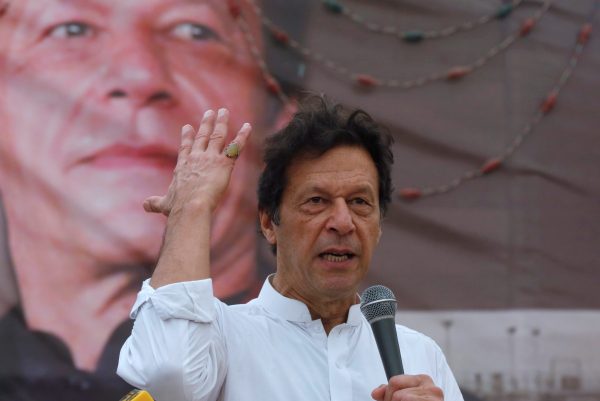Some political ‘experts’ and ‘analysts’ of the country’s mainstream media have already given their verdict that Imran Khan’s Pakistan Tehreek-e-Insaf (PTI) party is destined to win with the military establishment’s implicit support. Others confidently predict a hung parliament with no party succeeding in getting a majority because such a result would supposedly benefit the military establishment.
The general perception outside of Pakistan is that the current Pakistan Muslim League (Nawaz) (PML-N) government is being systematically targeted by a campaign put in place by the military establishment to neutralise former prime minister Nawaz Sharif and his party. Allegations about the Sharif family’s financial holdings in Panama and the United Kingdom, and about Nawaz Sharif holding a work-visa for the United Arab Emirates while prime minister, led to Sharif being put on trial for and found guilty of corruption. He was consequently disqualified from holding office in 2017.
Following Sharif’s disqualification and now his conviction, Pakistan’s judiciary has been accused of explicitly targeting the former prime minister, his family and PML-N party members to ensure that the party is weakened before the elections are held. On top of that, while the judiciary has barred some politicians from contesting on flimsy grounds, extremist leaders and political groups are being allowed to run. This is raising doubts about the fairness of the election process.
Even with such alleged election rigging, Pakistan’s electoral and political landscape is not as binary as it is perceived globally.
Manipulating polls might sound like an easy way to ensure success, but the results from Pakistan’s previous three elections suggest otherwise. In the 2002 general elections, ‘managed’ by then-military dictator General Musharraf, Pakistan Muslim League (Quaid-e-Azam) formed a coalition government. But even with the alleged rigging, the Pakistan People’s Party (PPP) won more seats (81 in total) than it had expected.
Then in 2008, on the back of former PPP leader Benazir Bhutto’s assassination, the PPP rode a popular wave of sympathy to form a coalition government. But again, the PML-N unexpectedly won 89 seats and also succeeded in forming a provincial government in the country’s largest province Punjab.
Finally, in the 2013 elections, where many expected the PTI to grab a similar number of seats to the PML-N, the latter succeeded in forming a majority government with the PTI winning only 35 seats.
When looking at the political parties’ wider appeal, none of this year’s contestants can currently claim to have a nation-wide following. The PPP, once regarded as the only national party, is now confined to the Sindh province owing to massive corruption scandals that tainted its time in government between 2008 and 2013. The PML-N, rightly regarded as a Punjab-centric party, is focusing on its provincial stronghold. And Imran Khan’s PTI, initially aiming to root out corruption from the country, has started welcoming turncoats from other political parties on the rationale that these individuals are ‘electables’ who know the ‘science of how to win polls in rural pockets’. The once-nationally popular Khan is losing some of his appeal. Moreover, while Nawaz took an anti-military and anti-judiciary stance, his brother Shahbaz Sharif (who is currently leading the party) has maintained a somewhat reconciliatory tone. This produces a confused narrative among the Punjab voter base of the PML-N.
An important facet of all the election hype is the lack of attention given to security issues in the country. The global financial watchdog, the Financial Action Task Force, recently decided to return Pakistan to its global terror financing ‘grey list’ (following its conditional removal in 2015) due to Pakistan’s inadequate efforts to curb terror and militant financing. But Pakistan’s interim government is only mandated to ensure free and fair elections, and global security concerns are low on its priority list. If left unaddressed, security concerns may undermine the country’s continued development.
Doubts about the fairness of the elections may also create a dilemma for the incoming government. If there are questions about the fairness of the election process, losing parties may find it hard to accept the outcome. If that is the case, the ‘elected’ government would have to dedicate much of its time and energy to appeasing the opposition parties and public grievances, rather than working on more important matters like improving the country’s economy and security.
Despite the many uncertainties, Pakistanis should celebrate the fact that the country is witnessing a relatively smooth democratic transition for the third time. With the country marred by prolonged military rule in the past, only such transitions — even with their shortcomings — can lead to gradual political and democratic progress. Yet this progress will have a hard time continuing unless the non-democratic forces in Pakistan stop manipulating and interfering in the political process.
Farooq Yousaf is a doctoral candidate at the University of Newcastle.

